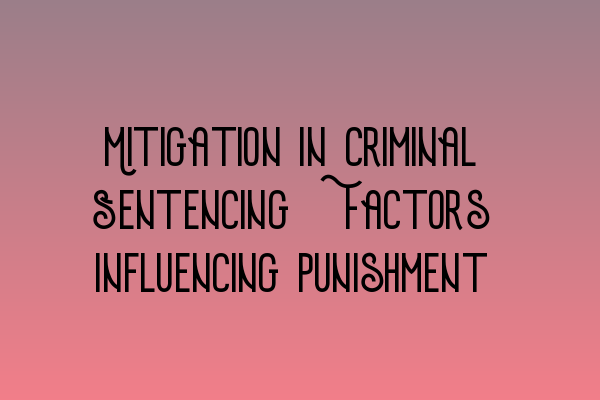Mitigation in Criminal Sentencing: Factors Influencing Punishment
When it comes to criminal sentencing, mitigation plays a crucial role in influencing the severity of punishment handed down by the court. Mitigation refers to the factors or circumstances that may reduce the culpability of the offender, resulting in a lesser sentence or more lenient treatment.
The Importance of Mitigation in Criminal Sentencing
Mitigation is essential as it recognizes that not all offenders are equally culpable and that punishment should be proportionate to the level of wrongdoing. It allows the court to consider both aggravating and mitigating factors, ensuring that the sentence reflects the individual circumstances of the case and the offender’s personal background.
There are various factors that can be taken into account during the mitigation process:
- Remorse and Rehabilitation: Expressing genuine remorse and demonstrating efforts at rehabilitation can significantly impact the court’s perception of the offender. It shows a willingness to change and take responsibility for one’s actions.
- Cooperation with Authorities: Assisting law enforcement agencies during the investigation or providing crucial information that aids in the prosecution of others involved in criminal activities can be considered as a mitigating factor.
- Mental Health Issues: If the offender has a documented history of mental health issues, it can be used to explain their actions and may lead to a more lenient sentence.
- Age and Personal Circumstances: Young offenders, first-time offenders, or those with dependents may be given more lenient sentences to provide an opportunity for rehabilitation or consider the impact of the sentence on their families.
- Victim Impact: If the offender has taken steps to repair the harm caused to the victim or society, such as compensating the victim or participating in restorative justice programs, it can be considered as a mitigating factor.
- Provocation or Duress: In certain cases, where the offender’s actions were influenced by extreme provocation or duress, the court may take this into account during the sentencing process.
It is important to note that while mitigation can reduce the overall punishment, it does not absolve the offender from the consequences of their actions. The severity of the crime and the need for deterrence and public protection will still be considered during the sentencing process.
As aspiring legal professionals preparing for the SQE exams, understanding the concept of mitigation in criminal sentencing is crucial. It is a topic that frequently appears in criminal law questions, both in the SQE 1 Practice Exam Questions and the SQE 1 Practice Mocks FLK1 FLK2. Familiarizing yourself with the factors that influence punishment will enable you to analyze and effectively apply mitigation principles in your future legal practice.
If you are looking for SQE 2 or SQE 1 preparation courses to enhance your knowledge and skills in criminal law and practice, consider enrolling in the SQE 2 Preparation Courses or SQE 1 Preparation Courses provided by SQE Criminal Law & Practice Law UK. These courses are designed to help you succeed in the SRA SQE Exam, and our expert tutors will guide you through various aspects of criminal law, including mitigation in criminal sentencing.
Stay up to date with the SRA SQE Exam Dates to ensure you are well-prepared and ready to excel in your exams.
Mitigation plays a significant role in criminal sentencing and understanding its importance and the factors that influence punishment is vital for any budding legal professional. Remember, mitigating factors can vary in each case, and it is the courts that ultimately decide on the weight and impact of these factors during the sentencing process.
